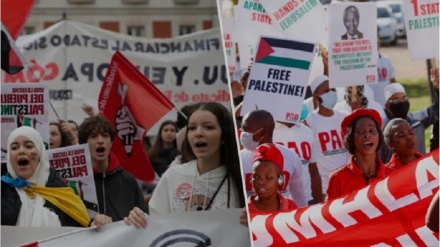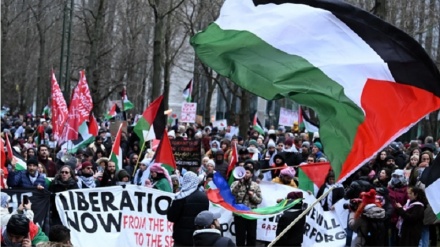Is there going to be a war between Hezbollah and Tel Aviv?
As maintained by Israeli military commanders and analysts, Hezbollah now poses a far greater threat to Israel than it did in the past. Not only is Zionist regime unable to win a new war, Hezbollah will not lose it. This powerful reality keeps many Israelis awake at night.
All this plus rocket rooms, drones, weapons caches, underground compounds, command posts, anti-tank positions, tunnels and launch pads, as well as many other military installations along the Lebanese border should be more than enough for Tel Aviv to keep quiet.
In this regard, we have prepared for you an article by 'Morteza Helali' under the heading: "Is there going to be a war between Hezbollah and Tel Aviv?" The article was taken from the website of Iran's English Language daily 'Tehran Times.'
Lebanon and Palestine share a 79-kilometer-long border that has suffered from tensions at different times due to the Zionist regime’s expansionist policies. Israel’s withdrawal from southern Lebanon in 2000, was not the end of its aggression in the border areas with Lebanon, as it still has occupied parts of the country.
While Zionist regime’s officials, especially Foreign Minister Israel Katz and War Minister Naftali Bennett, launches rhetoric against Iran and the Lebanese Islamic resistance movement, its top military and security sources are highly concerned about any war with Hezbollah.
In a recent position, a military analyst at the Israeli newspaper Yedioth Ahronoth reported that Lebanon’s Hezbollah has become more powerful over the past decades because of Israel’s failure and weakness, and now owns 150,000 missiles.
The analyst added that the regime must now establish peace on the southern borders and prepare itself for military operations on the northern borders.
The analyst also said Hezbollah is now capable of launching 1500 or even more missiles a day at the Occupied Territories and easily capture illegal Israeli settlements on the northern borders. We should be prepared for possible conflict that may occur at any moment. Israel is going through a difficult phase.
The Commander-in-Chief of the Israel Defense Rav Aluf Aviv Kochavi stated, “Peace with Hamas is a strategic necessity so that the Israeli army can confront the imminent danger by Hezbollah from the north”.
Retired Israeli General Yitzhak Brick affirmed that the Zionist regime's army is not ready for war at all, insisting that the regime has been threatening by hundreds of Iranian missiles in the region.
Brick claimed that the Israeli army lacked a security doctrine, stating that one is preparing the army for two fronts and the other is supplying hundreds of tanks, and it is unclear what is the job of the security cabinet in this situation? The security cabinet has become a play thing, and today has the least real impact on the army and military doctrine. The National Security Council has not cared about the security doctrine for a long time.
Pointing out that the regime faces an existential threat, the retired Israeli general stated that in recent years, Israel has been surrounded by big and small missiles. Today, there is a possibility of firing 1500-2000 missiles weighting 500-600 kg daily into military and strategic areas.
Brick added that we are not able to respond because Israel’s air force and missiles cannot counter missile attacks. Israel’s main enemy is Hezbollah, which has great military capability.
Amos Harel, the military expert at Haaretz newspaper said that the Israeli army suffers from problems that regard ground operations as a nightmare, from which it is always trying to escape.
Harel quoted sources related to Tel Aviv as saying that the Gaza War in 2014 showed the capability of the Israeli army, the last stage of disappointing process that has begun with the 2006 Lebanese war.
According to Israeli sources, if war be launched between Hezbollah and the Zionist regime, more than half of Israelis will flee to less dangerous areas.
This is while the Zionist regime’s economy will undergo significant problems due to factories shut down, power cut, water shortage, and other war-related problems, even if other fronts be in good condition.
In addition, Israelis are concern about offshore platforms and facilities, in particular, the Tamar, Karish and Tanin Gas Fields, which are respectively located at 23, 40 and 10 km of the coast. The Zionists, who have incurred huge costs to support the gas platforms, are still deeply concerned.
In order to maintain its air superiority, the Zionist army does not perform well in terms of secret military infrastructure. The regime's air force may supposedly be able to destroy many of visible targets, but it cannot deal with the movements and armed groups that pursue attrition warfare and carry out covert movements.
The Israelis have no confidence in their military capability, and their stance indicates their horror of the power and capability of Lebanon’s Hezbollah.
The Zionist regime of Israel and Hezbollah exchanged fire along the Lebanese border on Sept. 2019. Israel's military claimed it fired into Southern Lebanon after a number of anti-tank missiles fired by Hezbollah targeted its army base and vehicles near the border. Hezbollah was responding to an earlier drone attack by Israel. The missiles hit several targets in Israel's border town of Avivim.
According to Hezbollah, the missiles launched from Lebanon destroyed a tank, killing and wounding those inside it. The Lebanese army said Israel fired at least 40 shells towards the border towns of Yaroun and Maroun al-Ras after the missile attack.
Once again, the Israeli failure to grasp the nature of Hezbollah has caused a failure to grasp the predictable results in the new clash. Not only are the Israeli troops unable to win a new war on Hezbollah, the Resistance Front will not lose it.
Obviously, Tel Aviv has had a tough time over the past years in dealing with the Hezbollah of Lebanon in Syria, and it is desperate to save face by doing whatever it can.
In the face of such desperation, it is crucial to assert that the new Israeli campaign against Hezbollah will only produce further unity and resolve among the resistance fighters in Lebanon. It will in no way force the resistance into retreat from its lawful cause.
Lest we forget, it was Hezbollah which single-handedly managed to drive Israeli occupation troops out of Southern Lebanon and thrash their invincibility myth for good. It was Hezbollah which in alliance with Iran, Syria, and Russia managed to defeat foreign-backed terrorist groups on many fronts in Syria.
On the diplomatic and political front, Hezbollah has equally been the winner. The international civil society is now behind the Resistance Front’s campaign against terrorism, just as they did during the Hezbollah-Israeli War in 2006.
Some 14 years on, Hezbollah has been transformed. It is now a regional military power, a cross-border strike force, with thousands of soldiers hardened by years of fighting on Syrian battlefields. Hezbollah troops are now using in combat some of the most sophisticated armaments available, such as fourth-generation Kornet guided anti-tank missiles. They pilot unmanned aircraft and fight alongside artillery and tanks. They have taken vast lands from terrorists with Syrian-Russian air support.
In 2006, Hezbollah fought a guerrilla war against an invading army. Today, Hezbollah is also a conventional army. Hezbollah is said to have fired some 4,000 short-range missiles at the Occupied Territories throughout the past years. But today, it has over 100,000 missiles, including tens of thousands of accurate mid-range weapons and drones with larger warheads capable of striking anywhere and killing anyone in Occupied Palestine.
As maintained by Israeli military commanders and analysts, Hezbollah now poses a far greater threat to Israel than it did in the past. Not only is Zionist regime unable to win a new war, Hezbollah will not lose it. This powerful reality keeps many Israelis awake at night.
All this plus rocket rooms, drones, weapons caches, underground compounds, command posts, anti-tank positions, tunnels and launch pads, as well as many other military installations along the Lebanese border should be more than enough for Tel Aviv to keep quiet.
The message is implicit: Hezbollah hasn't lost its luster and another war could be more devastating and humiliating for the usurper regime. There will be a mutual exchange of bombing and destruction too. As maintained by Hezbollah Leader Sayyed Hassan Nasrallah, “The leaders of Israel understand that the resistance has the ability to cover the entirety of the Occupied Palestine with missiles. We must keep this capability because it acts as a deterrent for the third Lebanon war.”
In summation, Hezbollah is no longer a group or an organization. It is an army, a formidable army whose members are fighting the US-backed Zionist troops along the Lebanese border. Hezbollah is not afraid of Israel although it has always stressed that it would never start war with invasion. It has no intention to back down, just as the way it has every intention to win the next war with Israel if it is forced by the lunatic warmongers in Tel Aviv into such a war.
ME/SS


